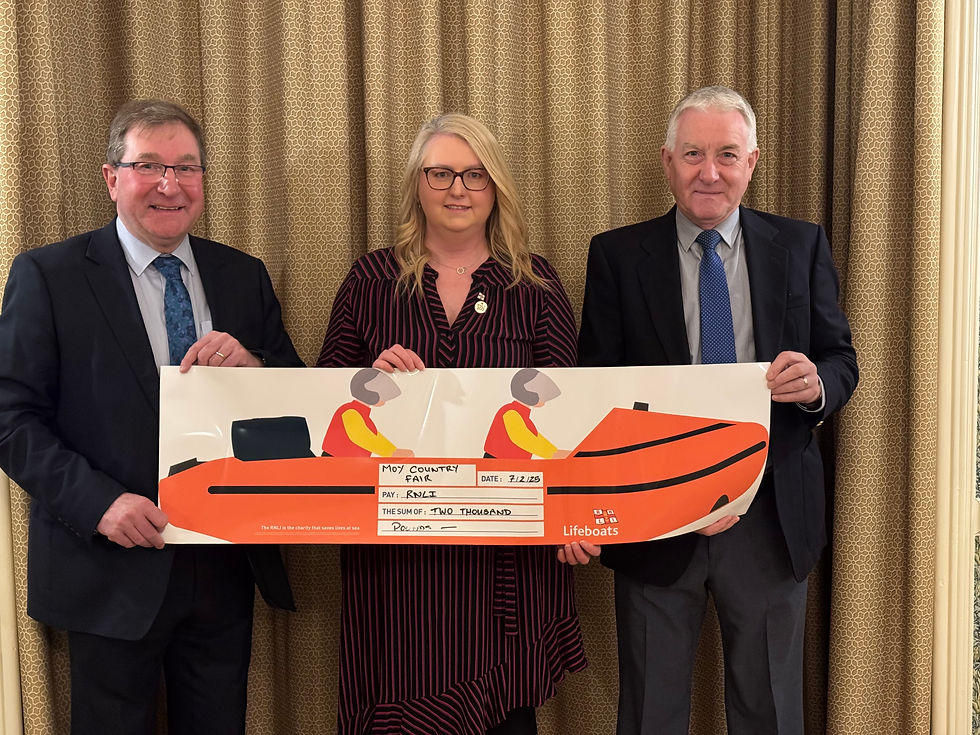Sponsor Spotlight - Ledingham Chalmers
- hfsf78
- Jul 17, 2024
- 4 min read

Moy Country Fair is a non-profit event that look to support a number of charitable causes each year. It is with the support of our event sponsors that we are able to host such a diverse roster of activities, exhibitors and performers for visitors to enjoy and maintain the cycle of providing charity fundraising space at the Fair itself or donating surplus funds to charitable causes. This year, Ledingham Chalmers have kindly sponsored our official show programme that can be purchased alongside admission tickets for only £2.
Read on to understand more about the services on offer from Ledingham Chalmers Solicitors through the words of Laura Marwick, associate:
Time to act on rural succession planning
We appear to be in the midst of one of the poorest summers in recent memory.
Mitigating the immediate impact on farm businesses will understandably be the rural sector’s main priority. That said, with the new chancellor, Rachel Reeves, set to announce the date for the autumn budget — which may mean tax relief changes for farmers and landowners — it may become increasingly important to tackle succession planning too.
Labour’s manifesto ruled nothing out in terms of Capital Gains Tax (CGT) and Inheritance Tax (IHT).
With other tax rises expressly ruled out and a clear statement made as to the level of revenue required to bridge the fiscal deficit, it seems likely a review of these levies will feature somehow on the new chancellor’s agenda.
Succession planning background
The starting point for succession planning must be an open conversation: sitting down as a family and discussing what the end goal is.
When it comes to planning your farm succession, given this is often a complex process, it is essential you seek sound and proactive professional advice sooner rather than later. Your solicitor will work together with other professionals such as accountants and land agents to help identify the options and highlight the potential pitfalls – including tax.
For farming families, the way the business is set up and how assets are held can make a big difference to what happens when someone dies. As such, each situation needs to be considered differently.
For example, perhaps you’ll need a new partnership agreement or to update an existing agreement. In some circumstances you may need a title transfer.
Where they exist, you should make sure your will is aligned with any partnership agreement (or company articles of association), otherwise unintended consequences may arise.
For example, a farmer may be in partnership with his brother and intend to leave his 50% business share to his son or daughter. However, if the partnership agreement dictates on his death any share goes to the surviving partner, then his legacy could be deemed ineffective and the surviving partner rather than the son or daughter would receive the share of the business, contrary to the will.
Legal rights
Speaking of unintended consequences, it’s important to be aware of ‘legal rights’.
Unique to Scotland, legal rights can significantly complicate rural business succession planning.
Here, a spouse or child cannot be disinherited. They hold an automatic right over a portion of the ‘moveable estate’. Where land and buildings are held out-with the business they do not form part of the moveable estate. But when the business holds these assets they form part of the moveable estate and legal rights calculation.
Claims can therefore be substantial, and you may have to sell off assets to raise the funds needed to pay out the claimants.
Furthermore, with separate rules concerning croft legacies and transfers, together with recent changes increasing tenant farmers’ options, it has never been more important to make sure you’re taking tailored advice to protect your business, whatever happens.
Current tax reliefs
At present, individuals have an IHT threshold of £325,000. Transfers between spouses are exempt and, for farm businesses, it is possible to claim Business Property Relief (for business assets) and Agricultural Property Relief for land and buildings. The rules here are complex.
Helpfully with CGT, the assets’ value ‘re-bases’ on death. Essentially this amount is reset to the market value on the date of the person’s death. This figure becomes the "starting point" for calculating any capital gains if assets are sold or transferred in the future.
For lifetime transfers, on the other hand, CGT can be off-putting.
However, at present, a disposal of agricultural property by way of gift may be eligible for ‘holdover’ relief, increasing the options for handing over the farm, either directly to an individual or by way of a partnership agreement, without incurring CGT. Holdover relief allows the person giving away the asset (the donor) and the person receiving it (the recipient) to essentially defer the CGT until the recipient sells the asset.
Different rules apply to assets not used for ‘agricultural purposes’, such as farm cottages with tenants not involved in the farming operation. Where no relief is available, the current rate of CGT applied to sales or transfers is 10-20% (dependent on the owner’s level of income).
With lots to consider in both the short and long term, Ledingham Chalmers has a pan-Scotland private client team to steer you through the succession planning process, including helping you make informed decisions now to minimise the risk of any tax changes ahead.
Find out more on ledinghamchalmers.com or contact me on laura.marwick@ledinghamchalmers.com / 01463 667 408.







Comments